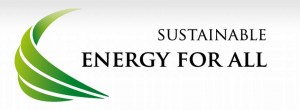 The EC announced at the high-level EU Sustainable Energy for All summit a new EU energy initiative which will provide access to sustainable energy for an additional 500 million people in developing countries by 2030.
The EC announced at the high-level EU Sustainable Energy for All summit a new EU energy initiative which will provide access to sustainable energy for an additional 500 million people in developing countries by 2030.
The proposed EU Technical Assistance Facility will provide EU expertise in the sustainable energy field. This will promote sustainable development and inclusive growth and will include a new EU Technical Assistance Facility, worth EUR 50 million over the next two years.
Tagged / energy
The future of EU Energy funding
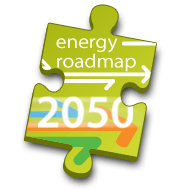 The European Commission has recently published an illustrated brochure on its “Energy Roadmap 2050” which is intended to be the basis for developing a long-term EU framework for energy policy.
The European Commission has recently published an illustrated brochure on its “Energy Roadmap 2050” which is intended to be the basis for developing a long-term EU framework for energy policy. The Smart Grids European Technology Platform, a stakeholder platform relating to smart grids, had published an updated version of its Strategic Research Agenda (SRA) entitled “SmartGrids SRA 2035”. This updates their previous research agenda from 2007. The presentations and conference summary from the Smart Grids 4th General Assembly, in March 2012, are also now available. The SRA of European Technology Platforms, such as the Smart Grids Technology Platform, are likely to influence future European Commission research calls. This is because they represent the views of a large stakeholder group on what future research priorities should be. The updated SRA should therefore be of interest to researchers interested in applying to European research funding in this area.
The Smart Grids European Technology Platform, a stakeholder platform relating to smart grids, had published an updated version of its Strategic Research Agenda (SRA) entitled “SmartGrids SRA 2035”. This updates their previous research agenda from 2007. The presentations and conference summary from the Smart Grids 4th General Assembly, in March 2012, are also now available. The SRA of European Technology Platforms, such as the Smart Grids Technology Platform, are likely to influence future European Commission research calls. This is because they represent the views of a large stakeholder group on what future research priorities should be. The updated SRA should therefore be of interest to researchers interested in applying to European research funding in this area.Forthcoming info days and key networking conferences…
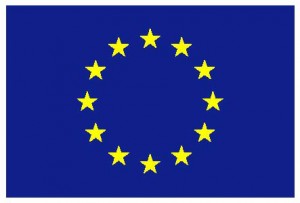 FP7 Information Day on The Ocean of Tomorrow
FP7 Information Day on The Ocean of Tomorrow
Brussels, 6th June
The European Commission will be holding an information day on “The Ocean of Tomorrow 2013” call on 6 June 2012 in Brussels. The information day will be aimed at those interested in the applying to “The Ocean of Tomorrow 2013” cross-thematic call. The event is the day before the information day for the 2013 Environment calls, which will allow people to attend both information days, if desired.
Registration is not open yet; more information is available on this leaflet.
2012 European Industrial Bioenergy Initiative Conference
Brussels, 5th June
The aim of the conference is to make the EIBI better known to the various biofuels stakeholders. Stakeholders along the whole biofuels value chains will be invited to attend the conference. Details will be published on the EBTP website as soon as they are available. Registration will begin in early May.
Conference on Energy Efficient Buildings and Districts: Research to Accelerate Innovation
Brussels, 15th May
The Energy Efficient Buildings Association (E2BA) is promoting an industry driven research, demonstration and innovation (RDI) programme for energy-efficient buildings and districts, with the ambitious vision that all European buildings and districts will be designed, built or renovated to high energy efficiency standards by 2050. Its 150 members come from industry, research organisations, SMEs, public promoters and agencies. E2BA is currently developing a new Roadmap for RDI priorities in the energy efficient built environment field for the period 2014-2020 and beyond.
Seventh European Photovoltaic Technology Platform
Amsterdam, 19th June
The conference will zoom into the challenges and opportunities of the European photovoltaic (PV) industry sector related to manufacturing as well as large-scale deployment. It will show how PV can continue to contribute to innovation and economic development in Europe when supported by adequate policies and measures.Innovation approaches, transition from incentive-driven to self-sustained markets for PV as well as long term scenarios will be analysed by selected representatives of the European Parliament, the Dutch government and world leading players of the PV industry.
Partner searches for water and energy research
 UKWaterResearchDirectory: An online directory of UK researchers has just been developed to support the Living With Environmental Change (LWEC) UK Water Research and Innovation Framework (UKWRIF) and the UK Natural Environment Research Council’s (NERC) Water Security Knowledge Exchange Programme (WSKEP). It covers all disciplines with interests in water and could be used to find partners for EU funded, and other, projects. Researchers who are not already on the database can add their details. It is also possible to keep up to date with additions and updates by subscribing to a mailing list. The main purpose of the Directory is to improve the ease by which government and industry can find research skills that they may be interested in, trade associations knowing who to invite to meetings/workshops for their members, and for the research community to have a better way of finding complementary research partners. The database has only just been launched and still being actively populated with researchers. It is also possible to keep up to date with additions and updates by subscribing to a mailing list. If so, you will receive no more than one update email per month.
UKWaterResearchDirectory: An online directory of UK researchers has just been developed to support the Living With Environmental Change (LWEC) UK Water Research and Innovation Framework (UKWRIF) and the UK Natural Environment Research Council’s (NERC) Water Security Knowledge Exchange Programme (WSKEP). It covers all disciplines with interests in water and could be used to find partners for EU funded, and other, projects. Researchers who are not already on the database can add their details. It is also possible to keep up to date with additions and updates by subscribing to a mailing list. The main purpose of the Directory is to improve the ease by which government and industry can find research skills that they may be interested in, trade associations knowing who to invite to meetings/workshops for their members, and for the research community to have a better way of finding complementary research partners. The database has only just been launched and still being actively populated with researchers. It is also possible to keep up to date with additions and updates by subscribing to a mailing list. If so, you will receive no more than one update email per month.
- climate variability and its impact on social and economic systems, including adaptation strategies and mechanisms;
- adaptation measures with a wide multidisciplinary nature with regard to development interventions;
- natural hazards (climate extremes) and their impact on society from the regional, national and global points of view;
- research methods oriented to mitigate vulnerability of society and improve its resilience towards climatic extremes, natural hazards and environmental risks;
- environmental limits of social and economic development from the environmental geography perspective;
- climate change and its impact on migration and environmental security;
- environmental changes (risks) and their impact on population processes, theoretical conceptualisation, drawing case studies;
- estimates of people vulnerable to climate variability carried out on the basis of climate modeling and simulations (regional and nation-wide level);
- analysis of the the relationship between the environment, economic growth, financial flows and population aspect (migration and development);
- relationships and impacts of interactions between the environment and society and the reflection of theoretical trends of environmental sociology;
- dissemination of environmental risks and understanding interest groups’ standpoints with regard to environmental risks (climate change);
- analysis and evaluation of economic benefits of adaptation strategies in selected sectors and applying suitable methods for optimal combination of these measures; and
- analysis of adaptation measures in bioenergy and agricultural sectors.
Intelligent Energy Europe free online support session next week
![]() The excellent service providers Intelligent Energy Europe (IEE) will be holding online support sessions on Wednesday 25th April at 2.30pm and Friday 27th April at 2.30pm.
The excellent service providers Intelligent Energy Europe (IEE) will be holding online support sessions on Wednesday 25th April at 2.30pm and Friday 27th April at 2.30pm.
The session on Wednesday 25th April will be on the subject of Costing your IEE Proposal and the session on Friday 27th April will be on the IEE Award Criteria – and how to address them effectively.
If you would like to join one or both of these sessions please email indicating which session/s you would like to join and you will be sent the telephone conference call dial in details and the weblink where you will be able to view the slides.
The online support sessions will provide you with a comprehensive and interactive presentation on key aspects of the IEE proposal preparation and submission process and an opportunity to ask questions. The feedback from those that have taken part in the sessions has been very positive and it only takes a small amount of time away from your proposal preparation work which should save you time in the long run. They will be referring to the material from these sessions when they undertake the proposal review process so it is recommended that you take part in the sessions in order to understand the messages fully.
Please contact the EU Energy Focus team with your questions on IEE and refer to the IEE factsheets on subjects including costing your IEE proposal and impact.
FP7 Energy: Expected Date of European Information Day and Brokerage Events on 2013 Calls
Some EU funding calls released – from water to social dialogue!
 MEDIA 2007 The Sales Agent Scheme 2012: One of the objectives of the programme is to encourage and support the wider transnational distribution of recent European films by providing funds to distributors, based upon their performance on the market, for further reinvestment in new non-national European films. The scheme also aims to encourage the development of links between the production and distribution sectors thus improving the market share of European films and the competitiveness of European companies. Deadline 18.06.12
MEDIA 2007 The Sales Agent Scheme 2012: One of the objectives of the programme is to encourage and support the wider transnational distribution of recent European films by providing funds to distributors, based upon their performance on the market, for further reinvestment in new non-national European films. The scheme also aims to encourage the development of links between the production and distribution sectors thus improving the market share of European films and the competitiveness of European companies. Deadline 18.06.12
Europe for Citizens: The European Commission, Education, Audiovisual and Culture Agency (EACEA), has launched a call for proposals (deadline 01.06.12) under the Europe for Citizens Programme. The Programme has five priorities and all projects are required to address at least one of these priorities:
- the future of the EU and its basic values;
- active European Citizenship: civic participation and democracy in Europe;
- inter-cultural dialogue;
- people’s wellbeing in Europe: employment, social cohesion and sustainable development; and
- impact of EU policies on societies.
Industrial Relations and Social Dialogue: The European Commission, Directorate-General for Employment, Social Affairs and Inclusion, has launched a call for proposals to promote industrial relations and social dialogue. This call is aimed at measures and initiatives designed to facilitate the adaptation of social dialogue to changes in employment and work-related challenges such as:
- addressing the modernisation of the labour market;
- quality of work;
- anticipation, preparation and management of change and restructuring;
- flexicurity;
- skills;
- mobility and migration;
- youth employment;
- contributions to health and safety;
- reconciliation of work and family life;
- gender equality;
- anti-discrimination;
- active ageing;
- active inclusion; and
- decent work.
Please note that there is a second deadline set to 4 September 2012 for actions commencing no earlier than 4 November 2012 and no later than 21 December 2012.
EDULINK II: EDULINK, the African, Caribbean and Pacific Group (ACP) – European Union (EU) Co-operation Programme in Higher Education, has launched a call for proposals. Proposals will have to address one of the following two priority areas: Energy access and efficiency; or Agriculture and food security. The specific objectives are to increase the capacity of ACP HEIs at two levels: Management /Administration and Academic. Proposals will aim at supporting HEIs in ACP States to create new and upgrade existing curricula and teaching methods, reinforce links between teaching, modern technologies, lifelong learning and research, as well as strengthening their management and administration capacity. Deadline 30.07.12
Sustainable Industry Low Carbon scheme (SILC): The European Commission, Directorate-General for Enterprise and Industry, has launched a call for proposals regarding the Sustainable Industry Low Carbon scheme (SILC).The objective of this call is to support actions that will enable energy-intensive manufacturing and process industries covered by the EU Emission Trading Scheme (ETS) to cope with the challenges of a low carbon economy and to maintain their competitiveness.
More specifically it seeks to identify and select sector-specific or cross-sectoral industrial projects that will develop and deploy cost-efficient technological or non-technological innovation measures, or a combination of both, for improving the GHG (greenhouse gas) emission performance of installations under the EU ETS. Deadline 25.06.12
Support of the European Innovation Partnership on Water: The Commission intends to award a contract to establish a secretariat for the EIP on Water. The secretariat will support the European Commission with the establishment and operational phase of the EIP on water. The activities will vary in nature, and will include secretarial tasks, contact with stakeholders at various levels, support in the development of a strategic implementation plan, co-ordination of the (outcomes of) innovation sites and development of a Web-based market place for water innovations. Deadline 23.05.12
ERA-NET Bioenergy Joint Call: The sixth Joint Call for Research and Development Proposals of the ERA-NET Bioenergy is now open in the areas of biogas and energy crops.The call topics are:
- Innovative biogas production. Focal points include e.g. pre-treatment technologies, unexploited substrates, measurement/control, upgrading, management of digestate; and
- Sustainable biomass for energy purposes. Focal points include e.g. optimisation of existing and new crops by way of plant breeding or cultivation techniques, breeding and cultivation for cascading uses, harvesting/storage technologies.
Please note that calls for proposals run by ERA-Net projects have their own funding rules and reimbursement rates. Applicants should check the call documentation for further details.
FP7 JTI Clean Sky Call for Proposals: Via the Calls for Proposal, Clean Sky aims to incorporate Partners to address very specific tasks which fit into the overall technical Work Programme and time schedule. Due to the nature of these tasks, the Call is not set up using a set of themes, but it is conceived as a collection of very detailed Topics which can be viewed on the Participant Portal webpage. Deadline is 10th July.
Thinking of submitting an Intelligent Energy Europe (IEE) proposal?
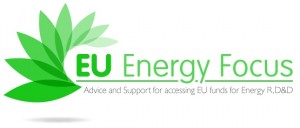 The EU Energy Focus team have a wide range of fantastic free services that can help with your submission for May.
The EU Energy Focus team have a wide range of fantastic free services that can help with your submission for May.
Pre-proposal check service – The Commission pre-proposal check service is open until 30th March. This allows you to submit a summary of your proposal to check that your proposal idea is in principle eligible for Intelligent Energy Europe (IEE) funding. Information on how to access the service can be found at the following website. You are encouraged you to submit your proposal ideas to the EU Energy Focus team for initial review so that they can be refined as much as possible to make the most of the Commission service.
Online support – Online support sessions will take place as and when required before the deadline. The online support sessions will provide you with a comprehensive and interactive presentation on key aspects of the proposal preparation and submission process. The feedback from those that have taken part in the sessions previously has been very positive and it only takes a small amount of time away from your proposal preparation work and it should save you time in the long run. The team will be referring to the material from these sessions when they undertake the proposal review process so it is recommended that you take part in the sessions in order to understand the messages fully. They will notify us of dates soon.
Proposal clinics – The team will be holding proposal clinics (one to one meetings of 1 hour with a member of the EU Energy Focus team to discuss your proposal) on the following dates:
- Monday 26th March – Manchester
- Wednesday 28th March – London
Please register your interest in attending a clinic session by sending a proposal summary to energie@enviros.com and indicating which date you would be available to attend a clinic. IEE will then allocate the sessions and inform you of the time for your meeting. Please let them know if you would like to attend a clinic session but are unable to attend on these dates in these locations as they will try to accommodate you on alternative dates or at other locations if this can be arranged.
Proposal review – they will be offering a proposal review service between Monday 16th April and the proposal deadline. Please email the team to let them know if you anticipate that you would like them to review your proposal so that they can keep a note of how many proposals to expect.
Great networking opportunity – European Sustainable Energy Week 2012
 The 2012 edition of the European Sustainable Energy Week (EUSEW) will take place from 18 to 22 June 2012. Every year, hundreds of organisations and individuals participate in the EUSEW by hosting Energy Day events and activities that promote energy efficiency and renewable energy sources. Further information is available on the ESEW website.
The 2012 edition of the European Sustainable Energy Week (EUSEW) will take place from 18 to 22 June 2012. Every year, hundreds of organisations and individuals participate in the EUSEW by hosting Energy Day events and activities that promote energy efficiency and renewable energy sources. Further information is available on the ESEW website.
Sneak preview of the Energy FP7 Calls for Proposals
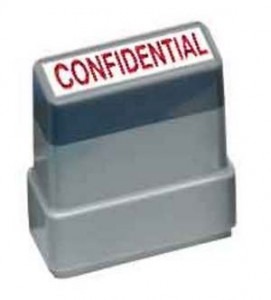 I have managed to obtain a draft of the EC FP7 Energy Work Programme. This is highly sensitive information and as the final document isn’t released until July, should give you a great head start to plan your proposal.
I have managed to obtain a draft of the EC FP7 Energy Work Programme. This is highly sensitive information and as the final document isn’t released until July, should give you a great head start to plan your proposal.
I’ve summarised the very dull document with easy to use hyperlinks to take you straight to areas you are interested in, and placed on the I drive along with our other summary FP7 documents. Please note that these are absolutely not to be circulated outside of BU – not even to your prospective partners! I:\R&KEO\Public\RDU\Draft Work Programmes for 2012-13
New EU Energy Roadmap 2050 – essential to read for FP7 Energy submissions!
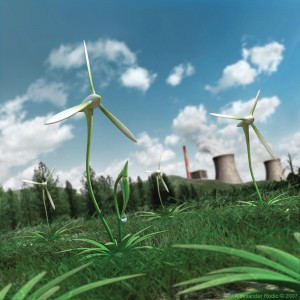 The European Commission has adopted the ‘Energy Roadmap 2050’ which is intended to be the basis for developing a long-term EU framework for energy. If you’re interested in applying for calls under the FP7 Energy theme, then you should familiarise yourself with the overarching principles to strengthen your application.
The European Commission has adopted the ‘Energy Roadmap 2050’ which is intended to be the basis for developing a long-term EU framework for energy. If you’re interested in applying for calls under the FP7 Energy theme, then you should familiarise yourself with the overarching principles to strengthen your application.
The Energy Roadmap 2050 sets out the challenges posed by delivering the EU’s decarbonisation objective, while at the same time ensuring security of energy supply and competitiveness, by analysing a set of scenarios to describe the consequences of a carbon free energy system and the resulting necessary policy framework. Key points from the Roadmap include:
- Decarbonisation of the energy system is technically and economically feasible
- Energy efficiency and renewable energy are critical
- Early investments cost less
- Contain the increase of prices
- Economies of scale are needed
If you’re thinking of applying for Energy FP7, read the Energy Roadmap 2050 Communication and FAQs on the Roadmap.
useful European energy policy and research funding landscape meeting notes available
Our contact in Brussels, UKRO has updated its briefing note on the European energy policy and research funding landscape. The briefing will be useful to any of you researching in the area of energy as it gives key insights into future policy, funding opportunities and provides detail on ways of engaging with key European players.
briefing covers the European Strategic Energy Technology Plan (SET-Plan) and related initiatives which include the European Industry Initiatives (EIIs), the Joint research Programmes (JPs) of the European Energy Research Alliance (EERA) and the European Universities Association European Platform of Universities Engaged in Energy Research (EPUE). It also includes updated Questions and Answers, including how they relate to FP7 and Horizon 2020, and links to further sources of information and newsletters.
You can read the notes from the meeting on the UKRO webpages.
European Energy Research Alliance seeks additional partners
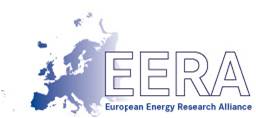 In spring 2012, fifteen other organisations will be selected as partners for a two-year term. The Alliance is now made up of ten energy research organisations, which got together in October 2008 to develop joint research programmes. EERA partners must pay an annual fee worth €10,000. Only one organisation can join per EU member state. The call for expressions of interest closes on 1 February 2012.
In spring 2012, fifteen other organisations will be selected as partners for a two-year term. The Alliance is now made up of ten energy research organisations, which got together in October 2008 to develop joint research programmes. EERA partners must pay an annual fee worth €10,000. Only one organisation can join per EU member state. The call for expressions of interest closes on 1 February 2012.
Thinking of submitting to FP7 Energy? There is a free support service available!
The deadline for proposals to the FP7-ENERGY-2012-1 Call is 25th October 2011 and the EU Energy Focus team is providing online support sessions, proposal clinic (one to one meetings of 1 hour with a member of the team to discuss your proposal) and proposal review services prior to the this deadline.
Online support session: This will be held on the key aspects of the preparation of a Stage 1 proposal 3- 4pm on Thursday15th September. The online support session will provide you with a comprehensive and interactive presentation on key aspects of the stage 1 proposal preparation and submission process and an opportunity to ask questions. If you would like to join this session please email and you will be sent the telephone conference call dial in details and the weblink where you will be able to view the slides.
Proposal clinic sessions: These are available in London on Thursday 22nd September. Register your interest in attending a clinic session by emailing a proposal summary. They will then allocate the sessions and inform you of the time for your meeting. If you would like to attend a clinic session but are unable to attend on this date in London they will try to accommodate you on alternative dates or at other locations if this can be arranged.
Proposal review service: This service is available between Monday 3rd October and the proposal deadline. Email to express your interest in this. All proposals will be treated as confidential.
Smart, Green & Integrated Transport: Report from Horizon 2020 Stakeholder Workshop
 The EU’s proposed Horizon 2020 Framework Programme for Research and Innovation will run from 2014-2020, replacing FP7. Over the coming months, the EC is preparing the proposals for the Programme and as part of this, holding stakeholder workshops on the proposed ‘societal challenges’ of Horizon 2020. The workshops took place in order to gather input from more than 100 stakeholders on what they would like from the next Transport programme; the first meeting was for stakeholders from all sectors including industry and academia and the second event was for national representatives, in order to get the view of Member States. Delegates were happy with Transport having its own ‘societal challenge’, but recognition is needed that it still contributes to excellence in the science base and to innovation and competitiveness. The next Programme should create effective transfer paths from research to industry, and act as an ‘integrator’, enabling technological development in other fields like ICT, energy and materials. Stakeholders agreed with the proposal of having the transport challenge built around ‘solution paths’: ‘Green transport’; ‘Integrated transport’; and ‘Competitive transport’. Delegates were also happy with the challenge focusing more on ‘research for industry’ and on electric vehicles but also stressed that the next Programme should still keep options open for other technological developments like hydrogen and fuel cells.
The EU’s proposed Horizon 2020 Framework Programme for Research and Innovation will run from 2014-2020, replacing FP7. Over the coming months, the EC is preparing the proposals for the Programme and as part of this, holding stakeholder workshops on the proposed ‘societal challenges’ of Horizon 2020. The workshops took place in order to gather input from more than 100 stakeholders on what they would like from the next Transport programme; the first meeting was for stakeholders from all sectors including industry and academia and the second event was for national representatives, in order to get the view of Member States. Delegates were happy with Transport having its own ‘societal challenge’, but recognition is needed that it still contributes to excellence in the science base and to innovation and competitiveness. The next Programme should create effective transfer paths from research to industry, and act as an ‘integrator’, enabling technological development in other fields like ICT, energy and materials. Stakeholders agreed with the proposal of having the transport challenge built around ‘solution paths’: ‘Green transport’; ‘Integrated transport’; and ‘Competitive transport’. Delegates were also happy with the challenge focusing more on ‘research for industry’ and on electric vehicles but also stressed that the next Programme should still keep options open for other technological developments like hydrogen and fuel cells.
Secure, Clean and Efficient Energy Challenge: Report from Horizon 2020 Stakeholder Workshop
 The EU’s proposed Horizon 2020 Framework Programme for Research and Innovation will run from 2014-2020, replacing FP7. Over the coming months, the EC is preparing the proposals for the Programme and as part of this, holding stakeholder workshops on the proposed ‘societal challenges’ of Horizon 2020. The discussion focused around these questions:
The EU’s proposed Horizon 2020 Framework Programme for Research and Innovation will run from 2014-2020, replacing FP7. Over the coming months, the EC is preparing the proposals for the Programme and as part of this, holding stakeholder workshops on the proposed ‘societal challenges’ of Horizon 2020. The discussion focused around these questions:
Are there new and emerging areas in addition to those identified in the EU’s Strategic Energy Technology Plan that should be supported? It was agreed that a systematic approach will be used when analysing the future development of energy technologies, taking into account EU energy and climate policies and ways to enhance Europe’s global competitiveness. The Challenge should cover the whole innovation cycle (basic research, applied research, demonstration and market introduction) and more support is needed for energy storage, renewable heating and cooling, marine energy, geothermal energy and materials.
How can research, demonstration and innovation targeting energy efficiency be reinforced and how can ICT contribute most effectively? It was agreed that better coverage of the energy efficiency deployment chain, work on risk management and research combining technology, market and social aspects of energy systems were seen as important. ICT is important to support smart grids, energy efficient buildings and neighbourhoods. European research can be made more attractive to industry through measures related to ‘technology push’ and ‘demand pull’. Having a stable environment in Europe, in terms of policy objectives, regulation and support, was seen as important. European Innovation Partnerships (EIPs) could be a possible way forward. The need to optimise the interaction between EU and national programmes was also emphasised, for example through Joint Programming.
A summary report of the stakeholder workshop on the ‘Secure, Clean and Efficient Energy Challenge’ has been published.
Partner Search: Ocean waves an energy alternative
 The Malta Industrial Innovation Research Center for Small to Medium-sized Enterprises is looking for partners in the field of tidal hydroelectric engineering. The project aim is to determine the optimum use of tidal flows for electrical generation. You can read more on the proposal and find contact details on the TIES Partner Search webpage.
The Malta Industrial Innovation Research Center for Small to Medium-sized Enterprises is looking for partners in the field of tidal hydroelectric engineering. The project aim is to determine the optimum use of tidal flows for electrical generation. You can read more on the proposal and find contact details on the TIES Partner Search webpage.
Latest EU energy related funding
 European Energy Efficiency Fund: this fund will invest in energy saving, energy efficiency and renewable energy projects, particularly in urban settings, with the aim of achieving at least a 20 per cent energy saving or an equivalent reduction in carbon dioxide and other greenhouse gas emissions. The fund will offer a wide range of funding streams such as senior and junior loans, guarantees or equity participation to local, regional and, under certain conditions, to national public authorities to promote sustainable energy investments. At its launch, the fund is worth a total of €265m with contributions from the European Investment Bank and national financial institutions.
European Energy Efficiency Fund: this fund will invest in energy saving, energy efficiency and renewable energy projects, particularly in urban settings, with the aim of achieving at least a 20 per cent energy saving or an equivalent reduction in carbon dioxide and other greenhouse gas emissions. The fund will offer a wide range of funding streams such as senior and junior loans, guarantees or equity participation to local, regional and, under certain conditions, to national public authorities to promote sustainable energy investments. At its launch, the fund is worth a total of €265m with contributions from the European Investment Bank and national financial institutions.
Eco-innovation projects: this funding supports the market penetration of an environmental product, service, management practice or process with a proven track record, but which has not yet been fully marketed. The indicative budget for this call is €36 million and funding will provide up to 50 per cent of a project’s costs over a period of 36 months. Closing date: 8 September 2011.
Assessment of scenarios and options towards a resource-efficient Europe: proposals should identify inefficient uses of resources that cut across different sectors and policy areas at meso- and macro-economic level and quantitatively assess the potential for, and effects of, efficiency improvements within systems. Funding is worth between €700,000 and €750,000 over 24 months. Deadline: 22.08.11.
Multilateral Research on Material Efficiency: Proposals are invited on the topic of Interdisciplinary Program on Material Efficiency – A first step towards sustainable manufacturing. This call will be supported by €10 million over a three year period and it is hoped that between eight and ten collaborations will be funded.











 Dr. Ashraf cited on ‘Modest Fashion’ in The Guardian
Dr. Ashraf cited on ‘Modest Fashion’ in The Guardian NIHR-funded research launches website
NIHR-funded research launches website Academics write for newspaper in Nepal
Academics write for newspaper in Nepal New paper published on disability in women & girls
New paper published on disability in women & girls Global Consortium for Public Health Research 2025
Global Consortium for Public Health Research 2025 MSCA Postdoctoral Fellowships 2025 Call
MSCA Postdoctoral Fellowships 2025 Call ERC Advanced Grant 2025 Webinar
ERC Advanced Grant 2025 Webinar Horizon Europe Work Programme 2025 Published
Horizon Europe Work Programme 2025 Published Horizon Europe 2025 Work Programme pre-Published
Horizon Europe 2025 Work Programme pre-Published Update on UKRO services
Update on UKRO services European research project exploring use of ‘virtual twins’ to better manage metabolic associated fatty liver disease
European research project exploring use of ‘virtual twins’ to better manage metabolic associated fatty liver disease